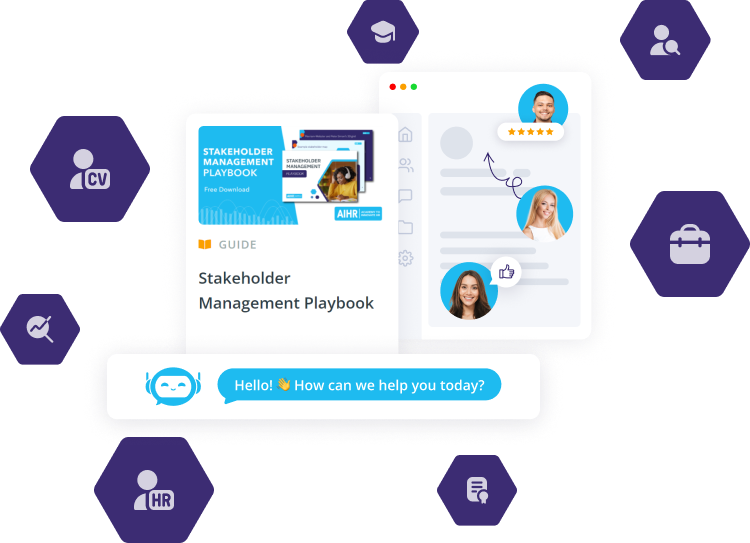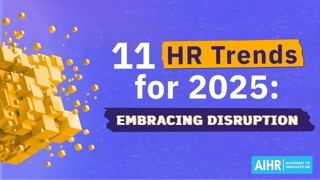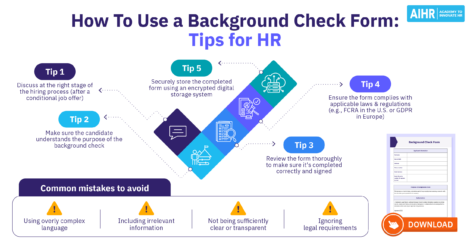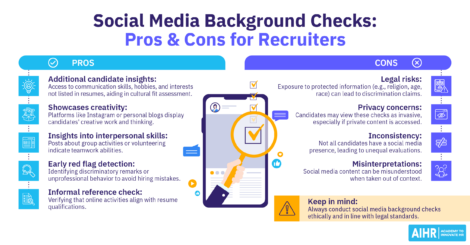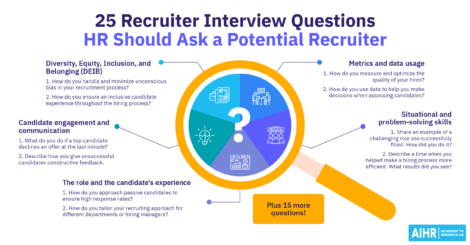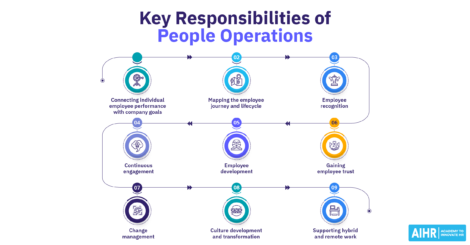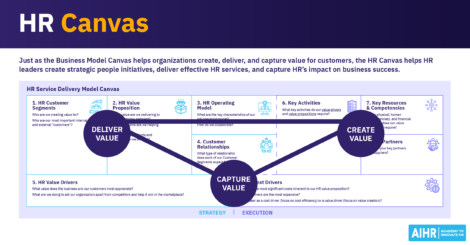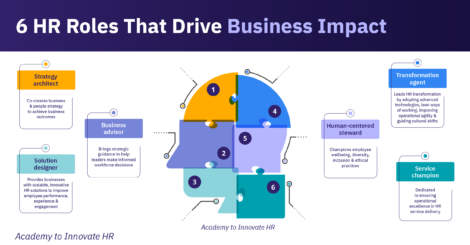11 Types of Interview Questions To Help You Pick the Right Candidate (Plus Examples)
70% of U.S. workers admit to lying on their résumés. Luckily, there’s an effective way to get around this—a well-rounded variety of interview question types. Learn which questions to ask to properly verify candidates’ suitability for every role.

Asking different types of interview questions can help you uncover deeper insights about candidates, who typically have more to offer beyond their résumés. Structured interviews with diverse questions can reveal useful information about candidates’ skills, experiences, and unique qualities, making them more predictive of job performance.
This article explores 11 types of interview questions, why they’re helpful, and how you can prepare for and conduct more effective interviews.
Contents
The purpose and importance of interview questions
11 types of interview questions to guide your hiring process
Choosing the right interview questions: Best practices
The purpose and importance of interview questions
Interviews are essential to making hiring decisions. When conducted successfully, these interactions reveal whether candidates can handle the job and add value to the organization. You won’t be able to access this information without the right types of interview questions.
Asking different interview questions allows you to assess whether a candidate fits the role or company culture and whether the organization can meet their needs and help fulfill their career goals. A good mix of interview question types should disclose the following:
- Candidates’ hard and soft skills
- Candidates’ verbal and non-verbal communication styles
- Details about candidates’ work experience and employment situations
- How candidates will approach the role and the work environment
- What candidates hope to accomplish in the long term.
11 types of interview questions to guide your hiring process
Below are 40 interview questions you can ask candidates, grouped into 11 different categories to ensure they cover all angles and provide a well-rounded view of each candidate.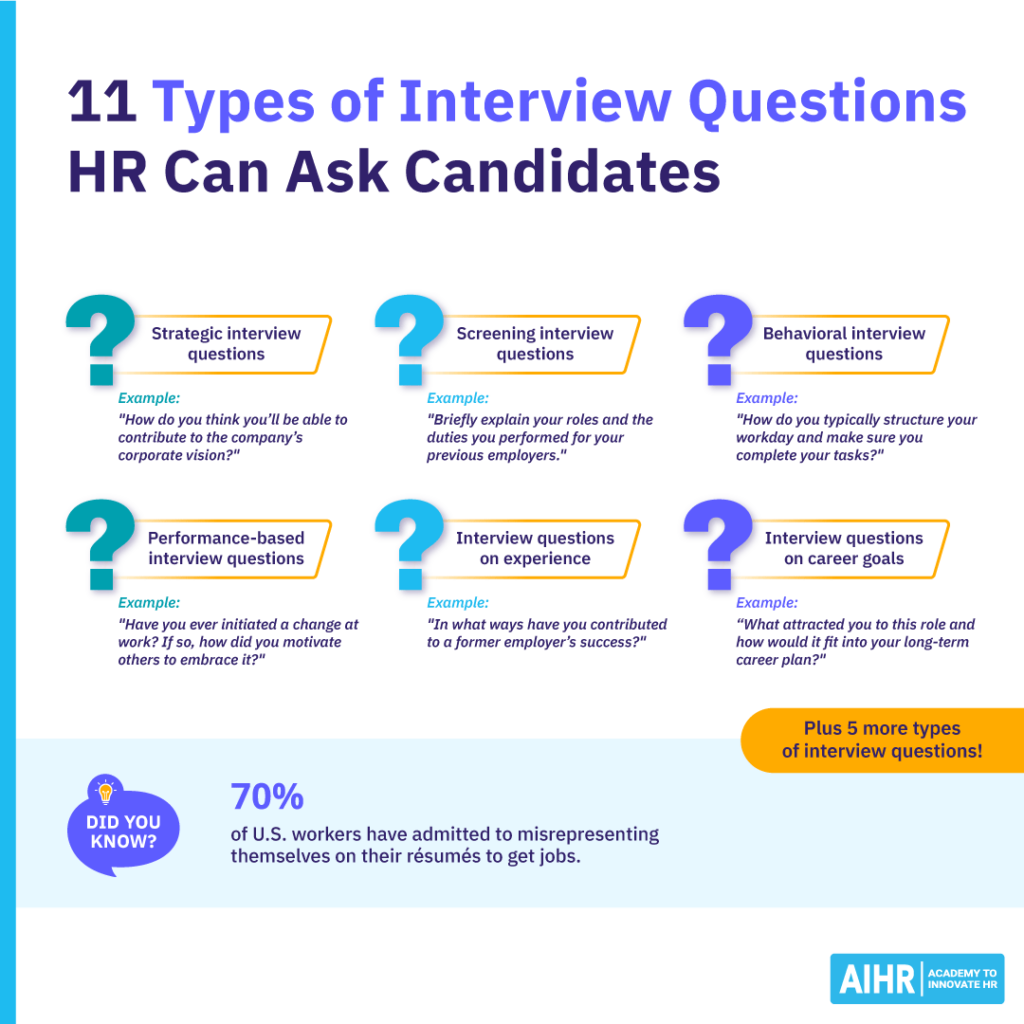
Strategic interview questions
Strategic interview questions help determine whether candidates align with your company’s values, goals, and long-term strategy. These are career-oriented, situational, and behavioral questions that prompt candidates to share specific examples from their previous experience.
These in-depth interview questions assess candidates’ problem-solving, critical thinking, and leadership abilities. They are useful when interviewing for leadership roles or other positions directly linked to strategic initiatives.
Examples
- Describe a time when you had to align a project with a company’s strategic objectives. How did you do it?
- How do you think you’ll be able to contribute to the company’s corporate vision?
- What sort of long-term impact do you think you could have on this role and organization?
- What challenges do you think this industry will face in the near future?
Screening interview questions
You can use screening interview questions to narrow down your applicant pool. These recruitment interview questions posed during a brief phone or video call act as an initial evaluation of which candidates meet the essential criteria to advance to the next round.
Asking the right questions at this crucial stage of the hiring process ensures hiring teams meet only the strongest candidates for the role, saving time and resources for HR and the organization.
Examples
- Briefly explain your roles and the duties you performed for your previous employers.
- Describe how your experience relates to the role you’re interviewing for.
- What key features should your ideal work environment have?
- Tell me about a challenging work situation or conflict and how you handled it.
Behavioral interview questions
Behavioral interview questions explore how candidates behave in work situations through their descriptions of real-life scenarios. They lead candidates to share their thoughts, actions, habits and approaches to communication and problem-solving
Examples
- How do you typically structure your workday and make sure you complete your tasks?
- Tell me about a time you had to accept or give constructive criticism. How did you handle it?
- How have you overcome feeling overwhelmed in a new role or with a new task?
Performance-based interview questions
Performance-based interview questions focus on candidates’ achievements to assess their resilience, work ethic, and character. Their accomplishments indicate their capabilities and how they may perform in the role they are interviewing for.
Like behavioral interview questions, performance-based interview questions prompt candidates to discuss their prior professional experience in a way that relates to the role they’re interviewing for.
Examples
- Describe a professional goal you’ve set. How are you working toward it, and what did you do to achieve it?
- What aspect of your career are you most proud of and why?
- Describe a workplace problem you’ve faced and the steps you took to solve it.
- Have you ever initiated a change at work? If so, how did you motivate others to embrace it?
- Describe a time when you exceeded expectations for a role—how did you do it?
Learn to optimize the interview process with the right questions
To craft targeted questions to optimize your interview process, you must analyze job requirements, understand candidate profiles, and develop strong communication and critical thinking skills.
In AIHR’s Sourcing and Recruitment Certificate Program, you’ll learn to facilitate hiring manager interviews and conduct candidate and recruitment evaluations.
This online, self-paced Certificate Program will also teach you additional screening techniques in the interviewing stage and offer ready-to-use templates and guides to help speed up the screening process.
Interview questions on experience
These interview questions focus on what a candidate has learned from their previous work experience. They gather information on candidates’ skills, insights, and professional backgrounds.
Understanding what kind of experience candidates have to offer can help you gauge whether they can fulfill the duties of the position they applied to and how they might be able to contribute to the organization.
Examples
- What were the main responsibilities you had in your most recent position?
- In what ways have you contributed to a former employer’s success?
- How do you meet deadlines while ensuring your work is high-quality?
- Have you worked independently or as part of a team? Describe your overall experience.
Interview questions on career goals
Interview questions on career goals evaluate whether a role and the organization can help advance a candidate’s professional motivations and aspirations.
Asking career-oriented questions can reveal which candidates show more promise and long-term potential. A candidate whose career goals align with the role and what the organization can offer them is more likely to be an engaged employee, which in turn will boost retention.
Examples
- What are your career goals for the next two to three years?
- What attracted you to this role, and how would it fit into your long-term career plan?
- What types of development opportunities are you looking for in this role?
Situational interview questions
Situational interview questions act as hypothetical work scenarios to which candidates respond by articulating how they would react to or resolve a situation. These job interview questions highlight individuals’ thought processes and values.
Candidates’ answers also demonstrate their ability to think on their feet, make important decisions, and solve problems. They can also indicate whether a candidate prefers to rely on their own skills and instincts or seek input and collaborate with others.
Examples
- If you were given two high-priority tasks simultaneously, how would you determine which one to do first?
- What would you do if you witnessed a superior treating another employee inappropriately?
- As a team leader, how would you approach an employee whose performance needs improvement?
- How would you handle a client who has unreasonable expectations?
Technical interview questions
Technical interview questions assess candidates’ technical (or hard) skills. This refers to the know-how they must have to perform the tasks and functions associated with the role they’re interviewing for.
Technical interview questions are especially important for technical roles such as engineering, computer programming, and data analysis. However, these job interview questions also apply to other industries and positions that require specific expertise or aptitude in a particular software system.
Examples
- What tools and software are you proficient in?
- Tell me about your budgeting process and the software you’ve implemented for it.
- How do you ensure your design or content meets brand guidelines?
- Have you acquired any specialized certifications? What are they?
Competency-based interview questions
Competency-based interview questions evaluate candidates’ capabilities in handling a role. You can use these questions to assess time management, communication, and decision-making skills, as they require candidates to share examples of them using their essential capabilities in previous work situations.
Based on how candidates have used their skills in the past, you can pose follow-up questions that delve deeper into how they might handle the responsibilities and potential circumstances of the role.
Examples
- Describe a tough work-related decision you had to make. How did you go about it, and why?
- Describe a time when you had to meet an urgent deadline. How did you do it?
- Describe an occasion when you collaborated with other departments on a successful project. How did you manage this?
Open-ended interview questions
Open-ended questions require candidates to give detailed responses and don’t always have right or wrong answers. Instead, they encourage conversation and can lead to greater insight into a candidate’s personality and character.
Examples
- What motivates you to perform at your highest level?
- Why do you think you’re a good fit for this role?
- Describe a time when you had to take initiative in solving a problem at work. How did you do it?
Close-ended interview questions
Candidates can typically give “yes” or “no” answers to close-ended questions or choose from a set of answers. These questions and their answers provide more straightforward, quantifiable data on candidates. This allows you to compare them more efficiently based on a set of predefined criteria.
Examples
- Which work environment do you prefer: in-person, remote, or hybrid?
- If offered this position, how soon would you be able to start?
- Would you be comfortable traveling for this role two to three times a year?
Choosing the right interview questions: Best practices
Preparing your interview questions is just the first step. Here are some best practices to keep in mind to make the most of each candidate interview:
Adapt questions to suit each role and your company culture
Whether you craft your own interview questions or get inspiration from other sources, be sure not to apply them universally. Not every question makes sense for every role—each position should come with questions tailored to its unique requirements.
Additionally, you can consider giving candidates an idea of the company culture by phrasing interview questions in a tone and style consistent with it.
“While interviews allow you to get to know a candidate, you’re still only seeing a snapshot of who they are. To make the most of it, ask questions that truly matter for the role and company. And don’t forget that interviews are a two-way street—leave room for the candidate to ask you questions. Their curiosity and the questions they ask can reveal a lot about their priorities, values, and understanding of the role. A well-planned interview helps both sides decide if it’s the right fit, so plan thoughtfully, listen actively, and make it count.”

Use a mix of question types
Different types of interview questions require different types of answers, which reveal more aspects of each candidate’s skills, experience, and attitude. This offers a well-rounded assessment that can help you make more informed hiring decisions.
You can start by determining the different types of interview questions that make the most sense for each role, then incorporate the ones that will lead to the most relevant information from candidates. For instance, situational interview questions could be especially important for customer-facing roles.
HR tip
Use the same set of question types for each candidate applying to the same role. You can gather more individualized information on them by customizing your follow-up questions based on how they answer your prepared questions.
Prepare in advance
Thoroughly review each job description to create a question framework relating to its responsibilities and required qualifications. Coordinate with the hiring manager to formulate questions based on specific scenarios and examples that synchronize with the job and ensure a thorough assessment of targeted abilities.
Research the candidate
Carefully examine candidates, résumés, applications, and other available information. Make notes on candidates’ résumés to help you remember key details and allow you to ask more personalized questions.
Doing this will allow you to make better use of your time during each interview time and go a little deeper if you’re already familiar with the candidates’ experience and education.
Practice active listening
Active listening helps you get to know candidates better and evaluate answers more effectively. This includes habits such as:
- Eliminating distractions (electronic device use, noise, interruptions)
- Using reassuring non-verbal cues/body language (eye contact, leaning in, smiling, nodding in agreement)
- Showing empathy (acknowledging emotions/concerns, giving candidates time to gather their thoughts).
To sum up
Using a variety of well-prepared interview questions helps you go beyond résumés to assess candidates’ skills, cultural fit, and long-term potential. A strategic mix of question types can help you gather the insights you need to make informed hiring decisions efficiently.
Additionally, effective interviews can shape your organization’s future by helping you identify top talent. By tailoring questions to each role and actively engaging with candidates, you can build stronger teams and achieve better business outcomes.
Learn more
Related articles
Are you ready for the future of HR?
Learn modern and relevant HR skills, online

